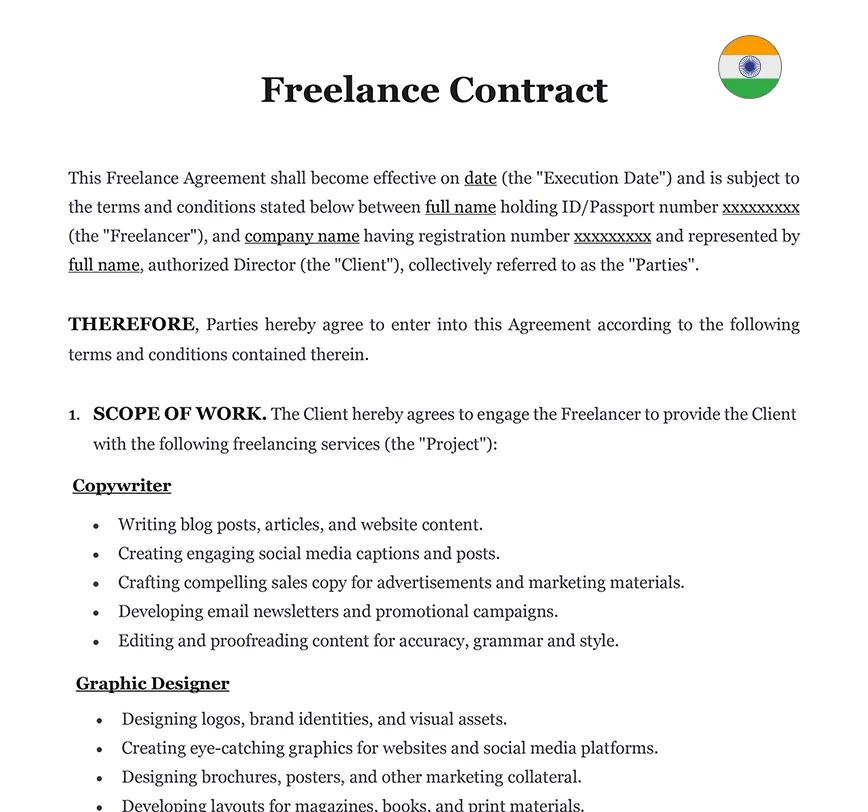Ready to use legal template
Drafted by experienced lawyers
Compliant with Indian law
Ready to use legal template
Drafted by lawyers
Compliant with Indian law
Home › Business contracts › Freelance Contract
Learn more about Freelance Contract in India
Freelance contracts in India serve as vital agreements between independent contractors and clients, facilitating business relationships. These contracts encompass essential elements such as service descriptions, project timelines, payment terms, intellectual property rights, confidentiality clauses, and dispute resolution mechanisms. It is crucial for businesses operating in India to understand the legal requirements and comply with applicable laws, including tax obligations and labor regulations. Seeking legal guidance ensures a solid foundation for successful freelance engagements, protecting the rights and interests of both parties involved.
Table of contents
What is the purpose of the contract?
The purpose of a freelance contract in India is to establish a legally binding agreement between the independent contractor and the client. It serves to define the scope of work, clarify expectations, and protect the rights and interests of both parties. The contract outlines the responsibilities, obligations, and deliverables of the freelancer, as well as the payment terms, project timelines, and any additional terms and conditions. By having a clear and comprehensive contract in place, both the freelancer and the client can ensure a mutual understanding of their roles and responsibilities, mitigating potential disputes and ensuring a smoother working relationship.
What are the advantages of a Freelance Contract?
Freelance contracts offer numerous advantages for both freelancers and clients, providing a solid framework for their working relationship. Here are some key advantages to consider:
1. Clarity and Expectations: A freelance contract establishes clear expectations regarding the scope of work, project deliverables, and timelines. It ensures that both parties are aligned and have a shared understanding of their roles and responsibilities, minimizing the risk of misunderstandings or disputes.
2. Legal Protection: A well-drafted freelance contract provides legal protection for both the freelancer and the client. It outlines the agreed-upon terms, such as payment terms, intellectual property rights, and confidentiality provisions, which can be enforceable in case of any breaches or disputes.
3. Professionalism and Credibility: Using a freelance contract demonstrates professionalism and instills confidence in the client. It shows that the freelancer takes their work seriously and is committed to delivering high-quality services within the agreed-upon parameters. This can enhance the freelancer’s credibility and reputation in the industry.
4. Payment Assurance: The contract specifies the payment terms, including the amount, schedule, and any additional expenses. This provides clarity and assurance for both parties, ensuring that the freelancer receives fair compensation for their services and the client knows what to expect in terms of financial obligations.
5. Intellectual Property Rights: Freelance contracts address the ownership and usage of intellectual property created during the engagement. It can clarify whether the freelancer retains ownership or transfers the rights to the client, avoiding potential conflicts or misunderstandings regarding the usage and distribution of the work.
6. Dispute Resolution: A freelance contract can include clauses that outline dispute resolution mechanisms, such as negotiation or mediation. This provides a structured approach for resolving conflicts, potentially saving both parties time and money compared to engaging in lengthy and costly legal proceedings.
7.Flexibility and Customization: Freelance contracts can be tailored to meet the specific needs of the engagement. Both parties have the flexibility to negotiate and include additional clauses or provisions that address their unique requirements, ensuring a more personalized and mutually beneficial working arrangement.
In summary, freelance contracts offer numerous advantages, including clarity, legal protection, professionalism, payment assurance, and the ability to address specific needs. Utilizing a freelance contract establishes a solid foundation for a successful working relationship between freelancers and clients, promoting trust, accountability, and a fair exchange of services.
What are the main clauses of the contract?
Freelance contracts typically consist of several important clauses that establish the rights, obligations, and expectations of both the freelancer and the client. While the specific clauses may vary based on the nature of the work and the parties involved, here are some key clauses commonly found in freelance contracts:
1. Description of Services: This clause provides a clear and detailed description of the services the freelancer will be providing. It outlines the scope of work, deliverables, milestones, and any specific requirements or specifications.
2. Payment Terms: The payment terms clause specifies the amount, method, and schedule of payment. It may include details on hourly rates, project-based fees, installment payments, or any additional expenses that will be reimbursed.
3. Intellectual Property Rights: This clause addresses the ownership and usage rights of the intellectual property created during the engagement. It defines whether the freelancer retains full ownership, grants a license to the client, or transfers the rights to the client upon completion of the project.
4. Confidentiality and Non-Disclosure: Confidentiality clauses protect sensitive information shared between the freelancer and the client during the course of the project. It outlines the obligations to maintain confidentiality and restricts the disclosure of confidential information to third parties.
5. Termination and Suspension: This clause specifies the conditions under which either party can terminate the contract or temporarily suspend the engagement. It may include provisions for notice periods, termination fees, or reasons for termination such as breach of contract or non-performance.
6. Indemnification: The indemnification clause outlines the responsibilities of each party to indemnify and hold harmless the other party from any claims, damages, or liabilities arising from the engagement.
7. Dispute Resolution: This clause sets forth the mechanism for resolving disputes, such as negotiation, mediation, or arbitration. It provides a framework for addressing conflicts in a timely and efficient manner.
8. Governing Law and Jurisdiction: This clause determines the governing law that will apply to the contract and the jurisdiction where any legal disputes will be resolved.
It’s important to note that freelance contracts can be customized to meet the specific needs of the engagement. Additional clauses may be included based on the nature of the work, such as non-compete agreements, non-solicitation clauses, or specific project milestones. Freelancers and clients should carefully review and negotiate the clauses to ensure they accurately reflect their intentions and protect their respective interests. Seeking legal advice can be beneficial to ensure the contract is comprehensive and enforceable.
Can a Freelance Contract be terminated?
Yes, a freelance contract can be terminated under certain circumstances. The termination of a freelance contract may occur due to various reasons, such as completion of the project, mutual agreement, breach of contract, or non-performance by either party. The contract should clearly outline the termination provisions, including any notice period required for termination and the rights and obligations of each party upon termination. It is important to review the contract terms and adhere to the agreed-upon procedures when terminating a freelance contract to ensure a smooth transition and avoid potential disputes.
How a Freelance Contract Can Benefit Your Business?
A well-drafted freelance contract can significantly benefit your business in several ways. By establishing clear terms and conditions between you and your freelance clients, a contract provides a solid foundation for a successful working relationship. Here are some key advantages of utilizing a freelance contract:
1. Clarity and Expectations: A freelance contract ensures that both parties are on the same page regarding project scope, deliverables, timelines, and payment terms. This clarity helps to avoid misunderstandings and ensures that everyone involved understands their roles and responsibilities.
2. Legal Protection: A contract acts as a legally binding agreement that safeguards your rights and interests. It provides a framework for dispute resolution and protects against potential breaches of contract, non-payment issues, or unauthorized use of your work.
3. Risk Management: By clearly defining project details, timelines, and payment terms, a contract helps manage risks associated with freelance engagements. It provides recourse in case of project delays, scope creep, or unforeseen circumstances that may impact project delivery.
4. Professionalism and Credibility: Utilizing a contract demonstrates professionalism and establishes credibility for your business. It instills confidence in your clients by showcasing your commitment to professional conduct, ethical practices, and adherence to industry standards.
5. Intellectual Property Rights: A well-crafted contract can address ownership and usage rights of intellectual property. It ensures that you retain ownership of your work and outlines the terms under which your work can be used or modified by the client.
6. Dispute Resolution Mechanisms: Including dispute resolution clauses in your contract can help resolve conflicts efficiently and avoid costly legal battles. Options such as mediation or arbitration can provide faster and more cost-effective solutions in case of disagreements.
By investing in a freelance contract, you not only protect your business but also foster a professional working relationship with your clients. It sets clear expectations, mitigates risks, and enhances your credibility in the freelance marketplace. Ensure that your contract is tailored to the specific requirements of your projects and seek legal advice if needed to maximize the benefits it offers.
Remember, a well-documented agreement not only protects you but also provides peace of mind and enables you to focus on delivering quality work to your clients.
SPECIAL OFFER
Startup
15 Document Package
Essential documents for running your business in India
Freelance ContractTemplate (.docx)
Save on attorney fees
310 client reviews (4.8/5) ⭐⭐⭐⭐⭐
Share information
Why Themis Partner ?
Make documents forhundreds of purposes
Hundreds of documents
Instant access to our entire library of documents for India.
24/7 legal support
Free legal advice from our network of qualified lawyers.
Easily customized
Editable Word documents, unlimited revisions and copies.
Legal and Reliable
Documents written by lawyers that you can use with confidence.




